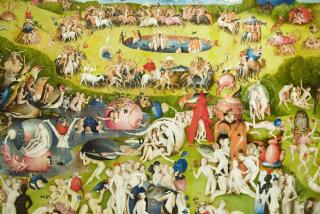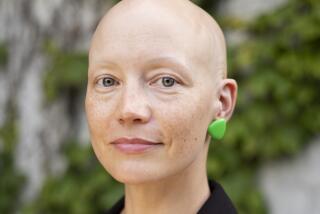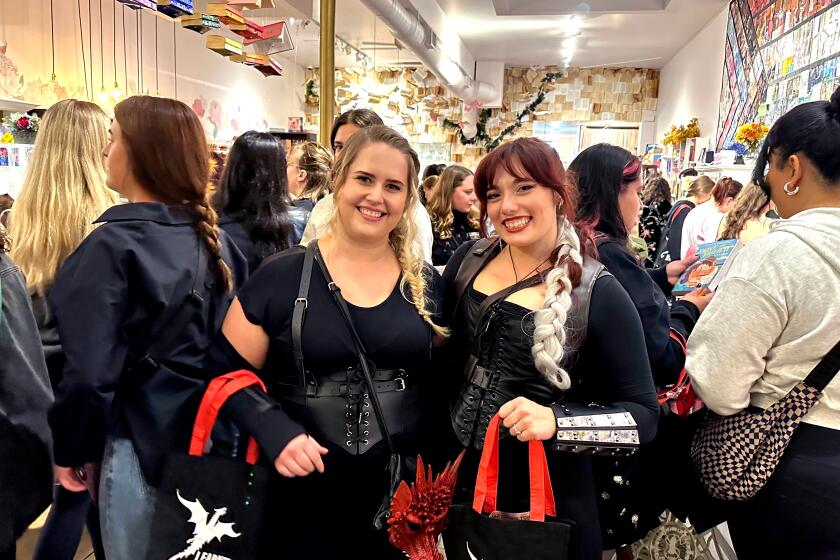Oh, the irony of it all
- Share via
BECAUSE of its highly precocious narrator, “Special Topics in Calamity Physics,” Marisha Pessl’s brick-sized debut, has already suffered comparisons to that ur-coming-of-age text “The Catcher in the Rye.” Because of its academic setting and murder-mystery twist, it also has been likened to Donna Tartt’s memorable first novel, “The Secret History.” And because it wears an overcoat of impish irony, various McSweeney’s authors are bound to be thrown into the referential mix. But be assured: Anything familiar about this hip, ambitious and imaginative book is easily overshadowed by its many pleasures.
The book’s real brilliance doesn’t become clear until the very end. No spoilers here, but anyone who finishes it will -- as with that most awesome of television shows, “Lost” -- want to go back to the beginning and start all over again; a second take will surely yield previously unnoticed clues and cues that make the conclusion almost obvious. Yet it’s possible -- and this would be unfortunate -- that readers not paid to read “Calamity Physics” will put it down before they get to the best parts, initially put off by the hyper-clever Blue van Meer, our precocious narrator, an overeducated 16-year-old virgin entering her senior year of high school.
Under the tutelage of her father, a dashing academic obsessed with revolutionary movements and seemingly doomed to a life of visiting professorships, Blue has collected a rather astonishing world of references from pop and intellectual culture, and throughout the book she tosses them off with a confidence more suited to one well beyond her years. Her citations range from the fact-based and obvious -- “Driving with Dad wasn’t cathartic, mind-freeing driving (see ‘On the Road,’ Kerouac, 1957)” -- to the utterly obscure, absurd and wholly imagined: “Mendelshon Peet wrote in ‘Loggerheads’(1932), ‘Man’s wobbly little mind isn’t equipped for hauling around the great unknowns.’ ”
Initially, her crazy erudition is just short of obnoxious. Yet, as Pessl’s twisty plot thickens and the copious nods to films and texts both real (“Bonjour Tristesse”) and made-up (“The Puppets That Changed Our Lives”) thin out, Blue leaves her Camille Paglia aspirations behind for a life more “Veronica Mars” and wins us over completely.
“Calamity Physics” is arranged like a syllabus for a Great Books course; each chapter bears the name of some masterwork. As it opens, we meet Gareth van Meer, Blue’s dad (chapter name “Othello”), who has resettled his daughter for about the 40th time, this time in a small North Carolina town called Stockton. (Natasha, Blue’s mother, died when her daughter was 5 years old, having apparently fallen asleep at the wheel after staying up all night working on her exotic butterfly collection -- from which Blue got her name, after the Cassius Blue variety.) Enrolled at St. Gallway School, Blue sets out to claim the top spot in her class and is quickly, if surprisingly, recruited to join an eccentric group of students who are hosted for dinner and conversation each Sunday evening by a stunning, unpredictable film teacher named Hannah Schneider.
Pessl has created a motley crew of kids; imagine that the elite, fashionable group from Whit Stillman’s film “Metropolitan” had swapped DNA with the dark horses from “Heathers.” Charles, who first recruits Blue, is “[g]old-haired, mercury-tempered ... not only St. Gallway’s Track and Field star ... but also its Travolta.” Jade is a “terrifying beauty” who conducts herself with a “fortresslike manner, which, like any well-built castle, made access challenging, [and] girls found her existence not only threatening, but flat out wrong.” The “ordinariness” of Nigel -- “five-feet-five with a round face, brown hair, features weak and baby-feet pink” -- was “extraordinary
Hannah, their older ringleader, is an enigma. Charles is in love with her, and it’s possible she’s slept with him, but he’ll never tell. Her house is a jumble of found junkyard objects and pets, her clothes are all variations on themes (from stiletto-clad vixen to hippie mama to outdoorswoman). For a reason no one can fathom, she is fixated on Blue; it was her idea to invite the new girl into the crowd after running into her and her father at the local Surely Shoes store.
The first half of “Calamity Physics” is this campus novel -- an exploration of the strange dynamics among odd teenagers and what happens when fresh blood is mixed with the old. The second half is a masterful murder mystery that takes over after Hannah is found dead -- in what first looks like a suicide -- on a camping trip she’d organized for her minions. (It’s giving nothing away to say that Hannah is the one to go; that is revealed at the beginning of the first chapter.)
Blue is the last to have seen Hannah alive, and clique members quickly blame her for their beloved teacher’s death. She sets out to clear her name, following tangled threads that curl around to earlier parts of the novel; before long, some of those closest to her are implicated in a much larger plot, in which Hannah apparently played some part. Some of Pessl’s best writing comes here, when Blue is alone in the world, fighting through a depression to keep working toward the truth. After days in her house, watching the news for any sign of progress on determining who was behind Hannah’s death, Blue takes a step forward:
“When I felt up to it, I ventured outside. The rueful weekend of rain had given way to conceited sunshine. It was too much -- the glare, the grass like straw. The sun harassed the yard with a shamelessness I’d never noticed before, inundating the leaves, scalding the pavement. Also offensive were the earthworms, those vagrants, visibly hung over from the downpour, so wasted they were unable to mobilize and fried themselves into orange french fries all over the driveway.”
“Calamity Physics” is bursting with writing like this: precise, smart, visual. There are many wonderful young writers out there, but it’s always refreshing to find another with such confidence, who takes such joy in the magical tricks words can perform. Blue van Meer might seem too clever by half, but Marisha Pessl is just clever enough.
More to Read
Sign up for our Book Club newsletter
Get the latest news, events and more from the Los Angeles Times Book Club, and help us get L.A. reading and talking.
You may occasionally receive promotional content from the Los Angeles Times.







